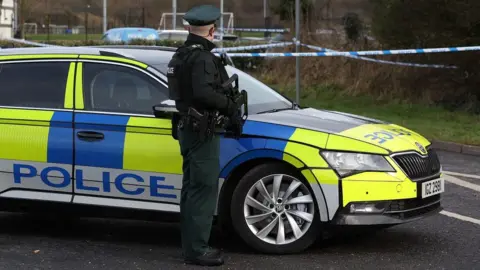PSNI data breach: 'Family fears for my safety as a police officer'
 PA Media
PA MediaA serving police constable has told the BBC that the accidental publication of personal details of officers in Northern Ireland brought home the fears his family have about his safety.
In response to a freedom of information (FoI) request, the Police Service of Northern Ireland (PSNI) shared names of all officers and staff, where they were based and their roles.
A spreadsheet containing the details was then published online.
It was removed a few hours later.
More than 300 police officers were murdered in Northern Ireland during the 30 years of violence known as the Troubles and officers and staff remain under threat from republican paramilitaries.
The most recent attack was when Det Ch Insp John Caldwell was seriously injured in a shooting in Omagh, County Tyrone.
The constable - who the BBC is not naming for security reasons - said many of his colleagues went to great lengths to protect their identities and would be worried.
"Since joining the service I have moved house and spent a considerable amount of money making sure it is secure and to give me and my loved ones peace of mind," he said.
"I have chosen to do this job and over time have become accustomed to the risks, but what this breach has done is highlight the fear and concern that my family have about me doing this job."
The threat to officers means they must be extremely vigilant about their security.
Many, especially from nationalist communities, keep their employment secret, in some cases even from many family members.
'Safety is engrained into you'
Another serving officer told the BBC that she and her partner, who is also in the police, have spoken about when to tell their children about their jobs.
"These are the kinds of conversations you still have to think about, it's mad, in this day and age," she added.
"We have neighbours who don't know what we do and when we got a childminder we didn't tell her for ages what it was we did.
"Yes, we wear our name badges when out and about on the job, but we don't wear it at home or travelling.
"Most police officers are so conscious of their safety they don't just go shouting their profession about the place - it's engrained into you from the start."
 Pacemaker
PacemakerOne police officer has not been able to eat a meal at their mother's home for 10 years due to the security risk, according to Mike Nesbitt from the Ulster Unionist Party (UUP).
Mr Nesbitt, who sits on the Policing Board, which oversees the PSNI, said the biggest threat came from dissident republicans who opposed the peace process and wanted to destabilise the PSNI.
"What they are focused on is discouraging members of the nationalist community from joining the PSNI either as officers or as police staff," the UUP assembly member explained.
"And over recent years I would say the majority of attacks on police officers have been targeted at Catholics from the nationalist community."
He cited the murder Constable Ronan Kerr in 2011 and the attempted murder of Peadar Heffron in 2010 as examples of attacks which specifically targeted Catholic officers.
'Dismay, shock and anger'
A former Northern Ireland justice minister said officers were frightened and their families and friends could be "jeopardised" by the breach.
Alliance Party leader Naomi Long said some officers would consider their futures with the force and that the PSNI had a duty of care to ensure measures were put in place to offer officers proper guidance and additional security measures if necessary.
The Police Federation for Northern Ireland called for an urgent inquiry.
Its chairman Liam Kelly told the BBC that his overriding emotions were of "dismay, shock and anger".
"The men and women I represent are appalled that this has happened and they're justifiably angry," he said.
"The trust from our officers is broken by this."
Mr Kelly added it was fortunate the PSNI spreadsheet had not given home addresses, saying that would have been a "potentially calamitous situation".
Threat faced by police
During the Troubles, 302 police officers were killed.
They currently face a threat from dissident republican groups who oppose the 1998 Good Friday peace agreement and remain committed to using violence to try to bring about a united Ireland.
In March, the terrorism threat level in Northern Ireland was raised from substantial to severe, meaning an attack was highly likely.
However much of the information in the breach is already in the public domain.
For example, uniformed officers wear badges with their names and ranks when on duty.


The scale of this error is enormous.
It is probably the worst data breach in the organisation's 22-year history.
The consequences are a little more difficult to evaluate.
Had this contained addresses, it would have been catastrophic in terms of assisting terrorist groups target officers.
But the release of employee names could still expose individuals, many of whom take great care to keep who they work for a secret, even, in some cases, from friends and family.
That the information was published on a website for more than two hours will add to concerns within the workforce.

How did the breach happen?
The information was published in response to an FoI, but included data which should not have been released.
It was published on an FoI website, What Do They Know, on Tuesday afternoon.
The data was removed after two-and-a-half hours at the PSNI's request, once it became aware of it.
It includes the surname and first initial of every employee, their rank or grade, where they are based and the unit they work in, including sensitive areas such as surveillance and intelligence.
Assistant Chief Constable Chris Todd said the error was unacceptable and that trust and confidence with partners such as MI5 could be eroded by the breach.
ACC Todd said the investigation was ongoing, and an "emergency threat assessment group" has been established to look after the concerns and welfare of PSNI staff.
He said the group would give general advice on safety and security as well as immediate support for people who believed they were at risk or increased risk.
ACC Todd added that anyone who had the information and passed it on could potentially be committing a criminal offence.
The chief constable, Simon Byrne, is returning from holiday to attend an emergency meeting of the Policing Board on Thursday morning.
Northern Ireland Secretary Chris Heaton-Harris said he spoke to him earlier and was continuing to receive updates.
'A monumental error'
Sinn Féin deputy leader Michelle O'Neill said the breach was very worrying and that she hoped accountability would be achieved at the Policing Board meeting.
She said her thoughts were with officers, staff and their families.
Democratic Unionist Party leader Sir Jeffrey Donaldson described the leak as a matter of grave concern.
He said it was too early to be considering the chief constable's position but that he wanted a robust response from the PSNI's senior leadership team.
The Social Democratic and Labour Party's Matthew O'Toole said the breach was shocking and that the PSNI leadership faced grave questions.
"There are serving police officers and their families in Northern Ireland who will be nervous and anxious now and I am sure they feel completely let down by their employers," he said.
